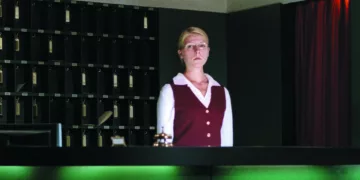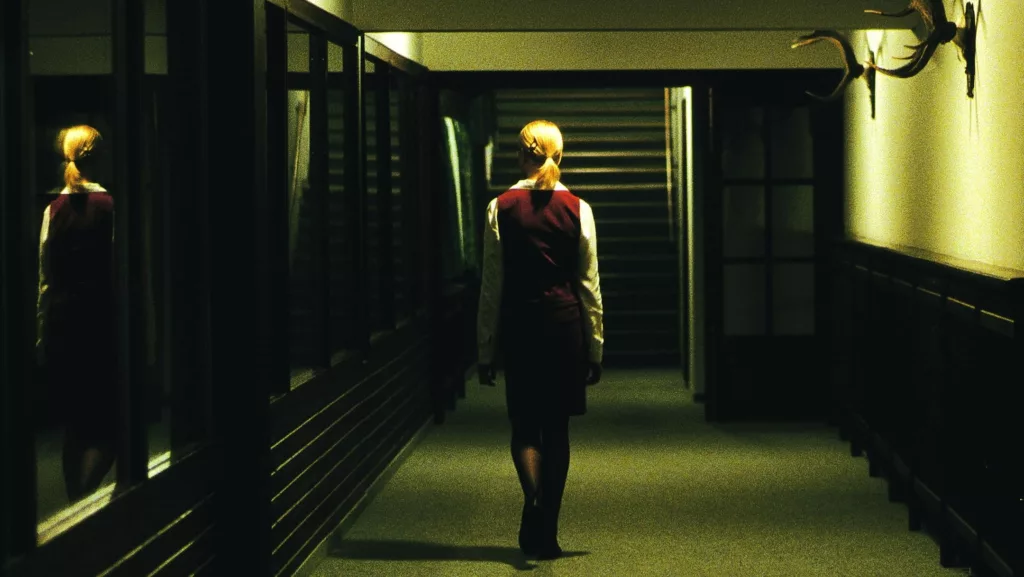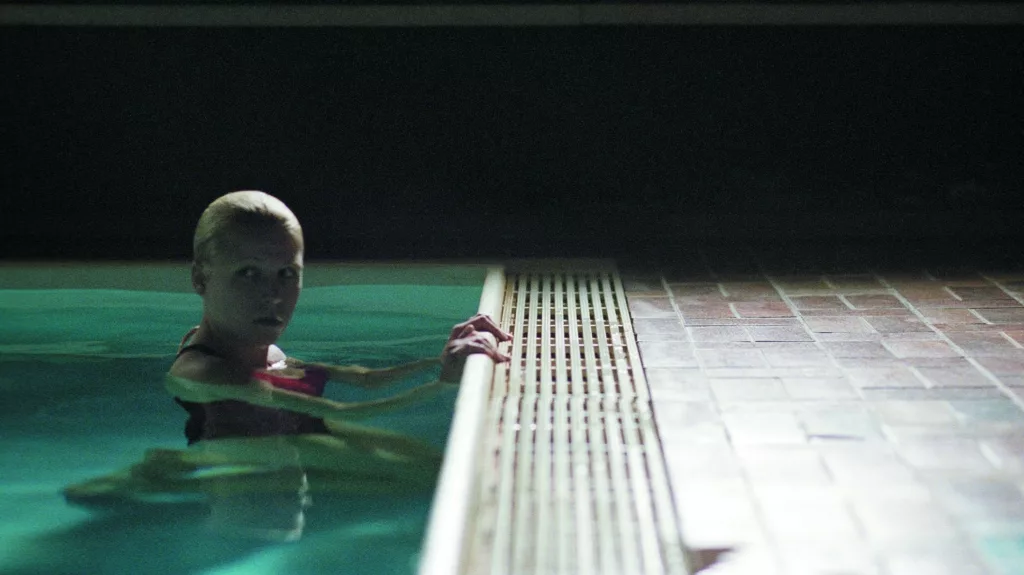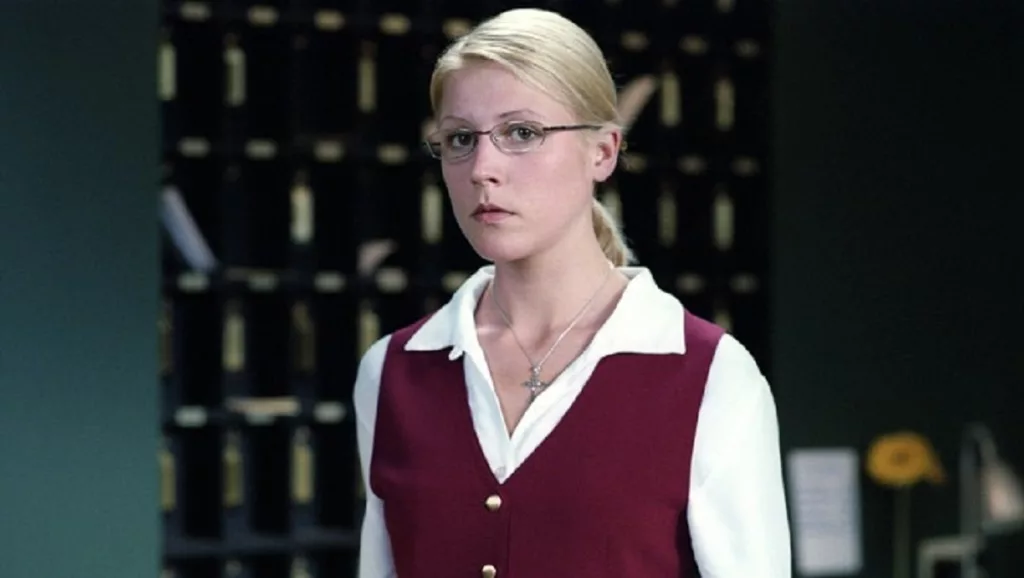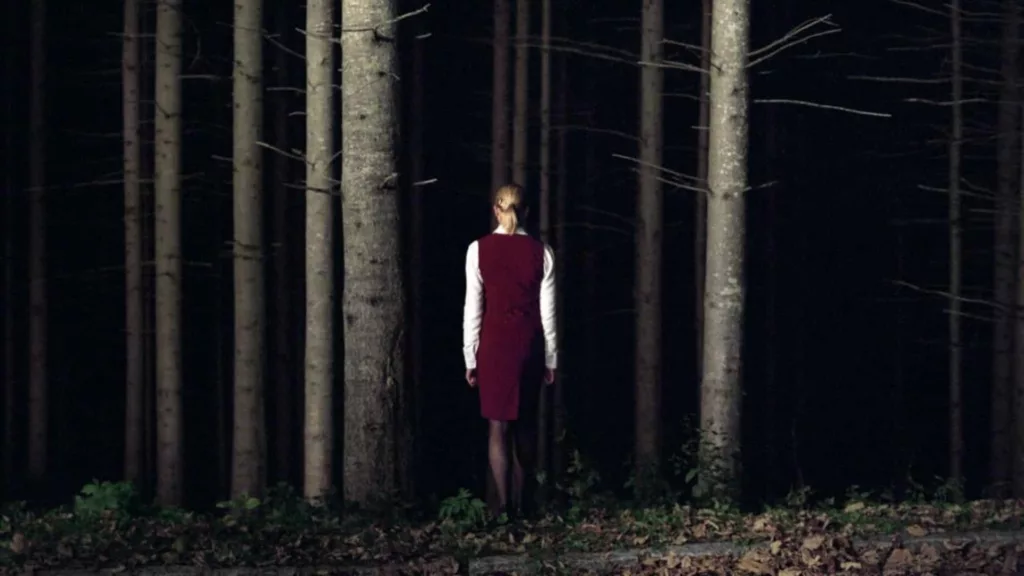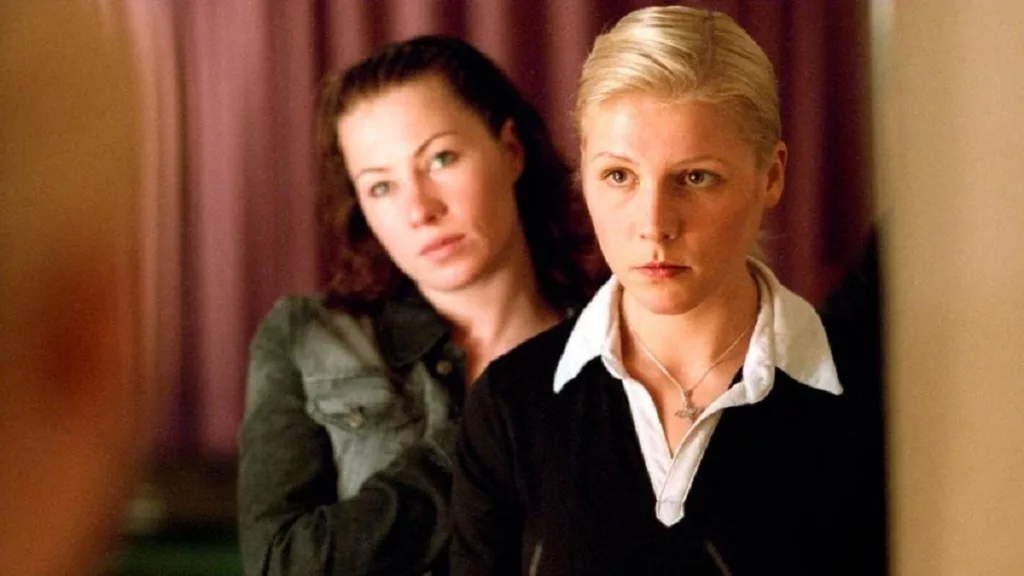Directed by Jessica Hausner in 2004, Hotel stars Franziska Weisz as Irene, a young woman who takes a job at a remote hotel located deep in the Austrian Alps. Shot on location, Hausner transports viewers to this serene yet unsettling setting, surrounded on all sides by dense forest. From its outset, the film piques curiosity with its commitment to subtlety and ambiguity over straightforward answers. As Irene settles into her new life among the hotel’s peculiar staff and mysterious past, she and the audience are left to puzzle over the meanings within its dark corridors and unspoken rules.
Through a purposefully disjointed narrative and observational camerawork that soaks in the hotel’s strange atmosphere, Hausner invites analysis of what remains unsaid. Minor details and ominous subtext are left for viewers to unpack. When other employees refuse to discuss the fate of Irene’s predecessor or the frequent disappearances near the infamous Devil’s Cave, an unsettling mood emerges between the lines. Franziska Weisz internalizes Irene’s growing unease through guarded facial expressions and tentative interactions with colleagues who seem to know more than they share. The film unfolds as much through suggestion as it’s directly shown.
Under its surface tranquility, the hotel hums with spectral energies that can be felt but never seen. In refusing explicit answers, it becomes a canvas on which audiences may project their own visions of secrecy and fear. With this subdued yet psychologically gripping tale, Hausner has crafted, much like her titular setting, a work of quiet mystery that merits thoughtful reflection long after the final images drift from view.
Unraveling Mysteries at an Austrian Hotel
Set deep in the lush forests of Austria lies an old mountain hotel, cut off from the outside world. Here, Irene arrives for her new job as a receptionist, hoping for a fresh start. But she finds the hotel’s staff to be cold, and its past is unclear. Her predecessor abruptly left under strange circumstances, and rumors swirl of disappearances in the dark woods nearby.
Irene tries to settle into her routine of cleaning and greeting guests. Yet something feels off about the hotel and its unspoken rules. The manager insists on keeping much of the building needlessly dark. And when an emergency exits one night through the basement door, it is forbidden to leave it unlocked. Strange figures also seem to lurk just out of sight down the long, twisting corridors.
Not helping ease Irene’s growing uneasiness is the story of a witch from folklore said to haunt the woods. Called the Lady of the Forest, she was once burned at the stake and is now said to dwell in an ominous nearby cave. Curiously, the hotel has a puppet of the witch on display, as if inviting comparisons to Irene and the hotel’s other female employees.
As Irene spends more time amid the hotel’s looming walls, she feels herself sinking deeper into its mysterious past. Her predecessor’s fate remains a mystery, and the tight-lipped staff seems to know more than they share. The only one to show Irene genuine friendliness is Petra, another young woman who has clearly been broken by the hotel’s oppressive atmosphere.
Determined to uncover the dark secrets lurking beneath the hotel’s tranquil surface, Irene continues poking around where she doesn’t belong. But will she expose truths better left hidden? And can she free herself from the strange grip this ominous mountain hotel now holds over its employees and all who check in, never to check out?
Creating a Labyrinth of Fear
Jessica Hausner’s directing in Hotel achieves something truly unnerving: crafting an atmosphere that constantly leaves you unsettled, even long after leaving the theater. She does this through the meticulous use of moody cinematography and spatial techniques that turn the hotel into a deep well of mystery.
Martin Gschlacht’s imagery is haunting, using long, static takes that soak in each location. Character shots often feel almost like still photographs, their piercing stares drawing you deep within. Within these enclosed spaces, the tiniest movements seem magnified with dread. You find yourself scanning every crevice for some hidden terror.
Much is made of the hotel’s sprawling layout yet claustrophobic feel. Endless hallways twist away into shadows, their destinations unknown. Doors lead to deeper, darker reaches seldom trod. Without many establishing shots, it’s impossible to grasp the full design—fitting, as the characters seem just as lost.
Hausner exploits this sense of getting lost. Scenes shift abruptly between areas, accentuating the disorienting effect. Tracking shots sweep through corridors at peculiar, swooping angles seemingly chosen to maintain unease. No space feels quite safe or fully understood.
Perhaps most unsettling are the deserted spaces within this social setting. The lingering shots on empty reception desks, dining rooms, and corridors create a profound loneliness amid the bustle. An unspoken dread lingers that threats emerge where company once stood.
So in hotels, less becomes exponentially more. Withholding information proves far more chilling than any shock. This restrained approach demands viewers lean forward in their seats, hungry to put together the myriad disturbing pieces. We search as helplessly as Irene for understanding within these walls, concealing darkness within darkness.
Through its masterful command of space, light, and movement, Hausner’s direction ensures this haunted hotel truly gets under your skin. Its labyrinthine passages will echo in your mind long after leaving its enigmatic mysteries unsolved.
Unraveling Irene
A strong anchor is needed to ground any psychological thriller, and Hotel finds this firmly in Franziska Weisz’s complex performance as Irene. From her very first bewildered moments, Weisz imbues the role with subtle nuance.
We sense Irene’s discomfort in this strange new environment, yet also her resolve to prove herself. Weisz subtly plays both her vulnerability and her increasing distrust of the hotel’s obscure workings. Behind polite smiles lies a growing anxiety, as if Irene navigates waters far deeper than they first appear.
The supporting players further add to this unease. Intentionally vague in their roles, they sketch out mysterious figures that could hold untold secrets. Their sparse interactions hint at tensions unseen, leaving one grasping for explanations that never come.
Weisz navigates Irene through this murk superbly. Her growing unease infects us as we scrutinize each new clue for understanding that remains elusive. In watching Irene slowly piece together unspoken truths, we become tangled in the hotel’s psychologically twisting threads.
Irene’s inner journey is the film’s heart, and in Weisz’s measured work, we find both empathy and curiosity. Questions consume us akin to Irene, wanting answers that may threaten more than they satisfy. Weisz anchors our obsession in her internally gripping performance, on which the entire production relies to unnerve and unsettle.
Under her guiding hand, we unravel alongside Irene, discovering in the hotel’s claustrophobic maze that peace of mind may prove the greatest mystery of all.
Past superficial appearances
The sprawling, isolated hotel alone makes Hotel ripe for exploring deeper themes. Its namesake setting serves as a stark yet evocative symbol from the very start.
Surrounded by dense woods casting long shadows, the hotel lurks almost like another character. Guests enter its cavernous yet womb-like interior seeking refuge, unaware of internal mysteries. And in the stillness of night, those same shadows seem to creep ever closer, their secrets seeping through walls into visitors’ dreams.
Darkness, in particular, permeates nearly every crevice. In a literal sense, many scenes are filmed in near-total blackness as characters traverse the woods or hotel corridors with nothing but the faintest glow to guide their way.
Yet the darkness runs deeper—it is an inescapable force hinting at some amorphous threat just out of view. A threat whose form remains abstract, like wisps of fog manifesting only in sidelong glances down empty hallways.
In this way, darkness becomes a metaphor for the anxieties and nameless dangers constantly lurking beneath the surface of our reality, if only we lift our eyes from the lamplight’s cozy ring. It highlights our instinctual fear of what remains unseen.
Isolation, too, features prominently as a metaphor. New employee Irene finds herself cut off within this sprawling yet claustrophobic space, unable to crack through its crew’s tight-knit secretiveness.
Alone, even amidst a bustling workforce, she grapples with carving out her own identity in a place intent on swallowing it whole. Her rising distrust of the hotel mirrors our own unease towards vast institutions holding mysteries beyond our control.
Works like The Shining explored such themes to chilling effect, and Hotel proves their relevance endures. Under Hausner’s guidance, this peculiar sanctuary becomes a blank canvas on which we project our deepest fears of uncertainty and powerlessness against looming threats we can never fully understand.
It transforms ordinary spaces into something far more unnerving and leaves us questioning what forbidden forces may lurk where we least expect them, just out of plain sight.
Hidden Depths
A hotel offers more than surface-level fright. Jessica Hausner’s subtlety challenges preconceptions of what horror can be, inviting deeper reflection long after viewing.
Minimalism is the film’s strength, trusting ambiguity over answers. It cultivates unease through atmospherics rather than shocks, making the psychological unease feel real. Franziska Weisz anchors this uncanny stillness with a complex portrayal of the pressures faced by Irene.
Though some crave resolution, Hausner skillfully expands boundaries. Her focus on unseen fears resonates more than visceral scars alone. Interpretation replaces forced meaning, empowering viewers’ creativity. The nature of this isolated world remains open to imagination.
Greater than gimmicks, the hotel lingers in memory. Its disquiet burrows inward to contemplate humanity’s inner terrain. Streamlined storytelling belies nuanced social commentary and metaphoric strength. Hausner challenges preconceptions through subtly unsettling craft.
By veiling truths but hinting at horrors beneath placidity’s surface, this film ensures its haunting stay with us. Inviting reflection on unseen terrors within ordinary lives, the hotel leaves a legacy of fear that resonates beyond a single viewing. Its hidden depths continue to shape future genre pioneers.
Beyond Surface Horror
Jessica Hausner’s Hotel is a mystery that continues to unsettle long after leaving its secluded grounds. By inviting interpretation over easy resolution, it presents a challenge few films dare.
Ambiguity is not a choice most directors make for commercial gain. Yet Hausner trusts her vision, crafting an experience more fascinating for its questions than answers. Dark forces swirl within the sparse tale, though their nature remains blurred.
It’s a subtle psychological fright far deeper than any surface-level shocks. The cinematography and atmosphere immerse us in the same creeping unease as the protagonist, Irene. Her journey becomes our own, navigating social ambiguities as well as narrative mysteries.
Franziska Weisz anchors the film with a performance embodying its quiet tensions. Guiding viewers through minimalist storytelling, Irene’s controlled fragility pulls us inward for contemplation as much as thrills.
While simplicity leaves some craving resolution, the hotel expands the possible in horror. It skillfully blurs lines between fear’s outer and inner terrains through thought-provoking restraint. Recasting expectations, Hausner set a standard for the reflective challenges few dare to make.
Many frightening films fade, but this intimate unease lingers long after, inviting repeated visits to sort its whispers from the dark. In redefining the invisible terrors inside ordinary places, the hotel ensures its nightmares will haunt imaginations for years to come.
The Review
Hotel
Jessica Hausner's Hotel is a chilling work of subtle artistry that uses ambiguity to burrow under the skin. Without resorting to shocks or easy resolutions, it cultivates an unsettling psychological unease and lingering sense of the unknown that has stayed with me long after viewing. Hausner challenges assumptions about her genre through refined storytelling and inviting complex interpretation over facile answers. Her nuanced craft expands the possibilities of horror into deeper, reflective territory.
PROS
- The subtle use of ambiguity and minimalism to cultivate unease
- Psychologically complex characters and performances
- Atmospheric cinematography and production design
- Thought-provoking exploration of themes like isolation and social dynamics
- Refined editing keeps the viewer constantly unbalanced.
- Invites interpretation without spoonfeeding answers.
CONS
- A slow, deliberately paced story may frustrate some seeking action.
- An open-ended and ambiguous conclusion won't satisfy those wanting resolution.
- Subtle anxieties replace visceral scares for some audiences.
- Could benefit from additional context or subtle exposition.
